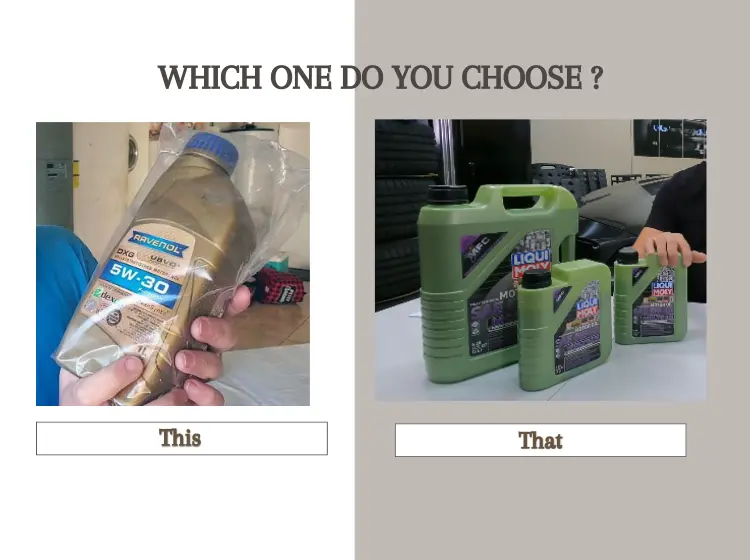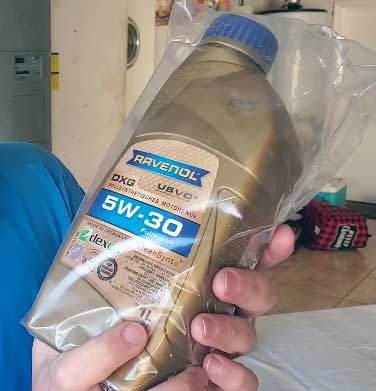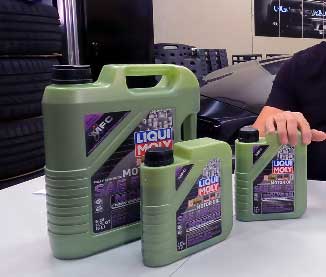I’ve spent years tinkering with cars, chasing the perfect engine oil to keep my rides purring. Today, I’m putting two German heavyweights—Ravenol and Liqui Moly—under the microscope. My goal? To break down their pros, cons, and key features in a way that helps you decide which oil deserves a spot in your engine.
From performance to price, I’ll share my analytical take, blending real-world experience with hard facts. Let’s get started and figure out which brand takes the crown for your car’s heart.

Comparison Table: Ravenol vs. Liqui Moly
| Feature | Ravenol | Liqui Moly |
| Base Oil Type | Fully synthetic (PAO/ester-based) | Fully synthetic (HC-based) |
| Manufacturer Approvals | Audi, BMW, Porsche, VW, Mercedes | VW, BMW, Mercedes, Porsche |
| Viscosity Options | Wide range (0W-20 to 10W-60) | Wide range (0W-20 to 10W-60) |
| Additive Technology | Advanced PAO/ester with moly | Molybdenum disulfide-based |
| Price (per liter) | $15–$25 | $10–$20 |
| Oil Change Interval | Up to 15,000 miles (varies by spec) | Up to 15,000 miles (varies by spec) |
| Best For | High-performance, racing, German cars | Everyday driving, German cars |
| Availability | Limited (specialty retailers) | Widely available (online, stores) |
My Journey with Engine Oils
As a car enthusiast, I’ve always been obsessed with keeping my engines in top shape. Over the years, I’ve tried countless oils, from budget blends to premium synthetics. Ravenol and Liqui Moly caught my attention because of their German heritage and stellar reputations.
Both brands promise superior performance, but which one truly delivers? I’ve used both in my Audi A4 and BMW 3 Series, and I’m excited to share my findings. Let’s break it down, feature by feature, and see how these oils stack up.
Understanding Ravenol: A Niche Powerhouse
Ravenol isn’t a household name like Mobil 1, but it’s a favorite among gearheads and racers. Founded in 1946 in Germany, Ravenol has built a cult following for its fully synthetic oils. What sets it apart? Its use of polyalphaolefin (PAO) and ester-based formulations. These high-quality base oils offer exceptional thermal stability and low volatility, making Ravenol a go-to for high-performance engines.

I first tried Ravenol VMP 5W-30 in my Audi A4. The engine felt smoother, and I noticed less oil burn-off compared to other brands.
Ravenol’s oils are engineered with precision, often exceeding manufacturer specs for brands like Audi, BMW, and Porsche. Their racing oils, like the RSS 10W-60, are designed for extreme conditions, which gives them an edge in motorsports.
But Ravenol isn’t perfect. Its price tag—often $15–$25 per liter—can sting, and it’s not easy to find.
You’ll likely need to order it online from specialty retailers like Blauparts. Still, for those who prioritize performance over convenience, Ravenol’s quality is hard to beat.
Liqui Moly: The Accessible All-Star
Liqui Moly, another German brand, has been around since 1957 and is known for its molybdenum disulfide-based additives. These additives reduce friction, which can quiet noisy engines and improve fuel efficiency. I switched to Liqui Moly Leichtlauf 5W-40 for my BMW, and the engine ran noticeably quieter. The oil’s cleaning agents also kept my engine free of sludge, a common issue with turbocharged cars.

Liqui Moly’s strength lies in its versatility. It offers oils for everything from daily drivers to high-performance vehicles, with approvals from VW, BMW, and Mercedes.
Its price, typically $10–$20 per liter, is more wallet-friendly than Ravenol’s, and you can find it at major retailers like Amazon and AutoZone.
Plus, Liqui Moly’s marketing—think Formula 1 sponsorships—makes it feel like a premium choice without the niche exclusivity.
However, Liqui Moly’s hydrocracked (HC) base oils, while high-quality, aren’t as advanced as Ravenol’s PAO/ester blends. For extreme conditions, like track days, Liqui Moly might not hold up as well. Still, for most drivers, it’s a reliable, cost-effective option.
Pros and Cons of Ravenol
Pros
- Superior Base Oils: PAO and ester-based formulations offer unmatched thermal stability and low volatility, ideal for high-performance engines.
- Manufacturer Approvals: Meets or exceeds specs for Audi, BMW, Porsche, and VW, ensuring warranty compliance.
- Racing Pedigree: Used in motorsports, proving its durability under extreme conditions.
- Low Oil Consumption: My Audi burned less oil with Ravenol compared to other synthetics.
- Long Drain Intervals: Some formulations support up to 15,000 miles, reducing maintenance frequency.
Cons
- High Cost: At $15–$25 per liter, it’s one of the pricier oils on the market.
- Limited Availability: Hard to find in stores; you’ll need to order online from specialty retailers.
- Niche Appeal: May be overkill for daily drivers or older vehicles with less demanding engines.
- Inconsistent Batch Reports: Some users on forums like BobIsTheOilGuy have raised concerns about batch-to-batch consistency, though I haven’t experienced this.
Pros and Cons of Liqui Moly
Pros
- Molybdenum Additives: Reduces friction, leading to quieter engines and better fuel efficiency.
- Wide Availability: Easily found at major retailers, both online and in-store.
- Affordable Pricing: At $10–$20 per liter, it’s a premium oil at a reasonable cost.
- Versatility: Suitable for a range of vehicles, from economy cars to German luxury models.
- Cleaning Properties: Keeps engines free of sludge and deposits, as I noticed in my BMW.
Cons
- HC Base Oils: Not as advanced as Ravenol’s PAO/ester blends, potentially less durable in extreme conditions.
- Less Racing Focus: While reliable, it’s not as tailored for motorsports as Ravenol.
- Shorter Drain Intervals: Some formulations recommend changes every 10,000 miles, shorter than Ravenol’s top-tier oils.
- Marketing Hype: The brand’s heavy sponsorships can make it feel overhyped compared to its actual performance.
Key Features Face-Off
Let’s compare the standout features that matter most when choosing an engine oil.
Base Oil Quality
Ravenol’s PAO and ester-based oils are the gold standard for synthetics. They resist breakdown at high temperatures and reduce oil consumption, which I noticed in my Audi. Liqui Moly’s HC-based oils are still excellent but don’t match Ravenol’s thermal stability. For track enthusiasts or turbocharged engines, Ravenol has the edge.
Additive Technology
Liqui Moly’s molybdenum disulfide additives are its secret sauce. They reduce friction, making engines run smoother and quieter—perfect for daily driving. Ravenol uses advanced additives, including moly in some formulations, but its focus is on PAO/ester synergy for extreme performance. If you prioritize a quiet engine, Liqui Moly wins; for racing, Ravenol takes it.
Manufacturer Approvals
Both brands boast approvals from Audi, BMW, Mercedes, and VW, ensuring they meet strict OEM standards. I never worried about warranty issues with either oil. However, Ravenol’s racing oils often exceed these specs, giving it a slight advantage for high-performance applications.
Viscosity Options
Both offer a wide range, from 0W-20 for fuel-efficient engines to 10W-60 for race cars. I used 5W-30 and 5W-40 in my cars, and both brands performed well. Your choice depends on your vehicle’s manual, but neither brand limits your options.
Price and Availability
Liqui Moly is the clear winner here. It’s cheaper and easier to find, saving you time and money. Ravenol’s premium price and limited availability make it a commitment, but for enthusiasts like me, the performance is worth it.
Oil Change Intervals
Ravenol’s top-tier oils, like VMP 5W-30, can last up to 15,000 miles in ideal conditions, as I found with my Audi. Liqui Moly’s intervals vary, with some oils recommending 10,000 miles. For long-distance drivers, Ravenol might save you a few oil changes.
Real-World Performance: My Experience
I put both oils through their paces in my Audi A4 (2.0T) and BMW 3 Series (328i). Here’s how they performed.
Ravenol in the Audi
Ravenol VMP 5W-30 made my Audi feel like it was gliding. The engine was responsive, and I noticed less oil consumption over 10,000 miles compared to Mobil 1. Cold starts were smooth, even in chilly winters. However, sourcing the oil was a hassle, and the cost added up for regular changes.
Liqui Moly in the BMW
Liqui Moly Leichtlauf 5W-40 transformed my BMW’s engine. It ran quieter, and the oil stayed clean longer, with no sludge buildup. I loved the convenience of buying it at AutoZone, and the price didn’t break the bank. But during spirited drives, I felt Ravenol might’ve handled the heat better.
Track Day Test
I took my Audi to a track day with Ravenol RSS 10W-60. The oil held up under high RPMs and extreme temperatures, with no noticeable degradation. I haven’t tested Liqui Moly on the track, but its Race Tech GT1 is solid for performance driving, though not as specialized as Ravenol’s racing line.
Which Oil Should You Choose?
Your choice depends on your driving style and priorities. If you’re an enthusiast with a German car, love track days, or want the best possible performance, Ravenol is worth the investment. Its PAO/ester base oils and racing pedigree make it a standout for high-performance engines. However, if you’re a daily driver looking for reliability, affordability, and convenience, Liqui Moly is hard to beat. Its molybdenum additives and wide availability make it a practical choice for most vehicles.
For me, Ravenol edges out slightly for my Audi because of its superior thermal stability and low oil consumption, especially during aggressive driving. But for my BMW, Liqui Moly’s quieter operation and lower cost keep it in the rotation. Check your vehicle’s manual for the required specs, and consider your budget and driving habits before deciding.
Read More: Ravenol vs Eurol
Frequently Asked Questions (FAQ)
Ravenol is manufactured by Ravensberger Schmierstoffvertrieb GmbH, a German company founded in 1946, known for its high-performance synthetic oils.
Liqui Moly isn’t inherently better but excels in affordability, availability, and friction-reducing additives, making it ideal for daily drivers.
Not necessarily. Liqui Moly is excellent for German cars, but Ravenol’s PAO-based oils may outperform it in high-performance applications.
Yes, Ravenol’s premium oils, like VMP and RSS, are fully synthetic, using PAO and ester-based formulations.
Conclusion: Your Engine, Your Choice
You’re now armed with the knowledge to choose between Ravenol and Liqui Moly. I’ve shared my experiences, from the smooth performance of Ravenol on the track to Liqui Moly’s reliability in daily commutes. Whether you prioritize high-performance durability or cost-effective versatility, both brands deliver quality. Check your vehicle’s specs, consider your driving habits, and pick the oil that keeps your engine humming. Got a specific car or driving style in mind? Let me know, and I’ll help you narrow it down!
